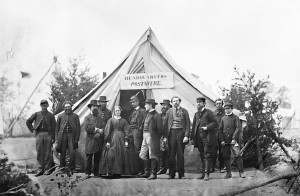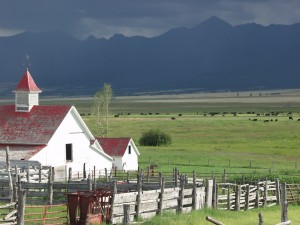Water Update by John Orr
Denzel Goodwin
The Upper Arkansas Valley said goodbye to cowboy, rancher and visionary Denzel Goodwin in February just before his 87th birthday. Goodwin (along with attorney Ken Baker) led the petition drive in the late 1970s that established the Upper Arkansas Water Conservancy District. Goodwin led the organization for 25 years and also served on the board of the Southeastern Colorado Water Conservancy District for 16 years. He helped found the Fremont County Water Users association in 1956. He also served as a Fremont County commissioner and on the Cotopaxi school and fire district boards.
The backstory, however, is how the man who claimed, according to The Mountain Mail, to be a “dumb ol’ cowboy” helped educate those around him on the business of water, hoping to ensure, “fair water use taking advantage of no user, no matter how small.”
Goodwin had a quick wit and could see through the complicated nature of water law and water issues. Terry Scanga, the current general manager of the Upper Ark district told Colorado Central that Goodwin, “understood human nature and genuinely liked people.”
While he may have liked most people, he was focused on protecting and acquiring water rights along the Upper Arkansas River, and also on getting more water to the valley.
Scanga tells a story about Goodwin and a negotiation on a water case. It was proposed that the parties go to Denver and meet with their counterparts. “You don’t want to rope in another guy’s arena,” Goodwin said, “You don’t know where the gopher holes are.”
It’s fair to say that Goodwin knew where most of the gopher holes were.
While on the Southeastern board, The Pueblo Chieftain reported, he advocated for irrigators. When he left the board he told them, “Count the members of this group who know how to use a shovel …That’s what you’re losing.”
Scanga told Colorado Central that the Upper Ark blanket augmentation plan (www.uawcd.com/Augmentation.php) was the “hallmark of Denzel’s tenure.” The plan was in response to a classic rebound call in 1977 where the Upper Ark valley diverters with their 1880 priorities were called out by the Rocky Ford Ditch. The call on the river was due to out-of-priority pumping near the Kansas state line which was later curtailed as a result of the Kansas vs. Colorado U.S. Supreme Court case.
“We have to do something so that folks up here can purchase water at a reasonable price,” said Goodwin, according to Scanga, because, “Water moves to people, people don’t move to water.”
After Colorado lost the case to Kansas, water users in “western Fremont County and Chaffee County, who got red tagged (shut down)” by the State Engineer, “could walk into the office,” and get augmentation water for their operations, homes or businesses, Scanga said.
Great leaders are defined by their service to the institutions they are part of and the people around them.
Scanga told Colorado Central that he made sure that Goodwin sat close to newcomers on the Upper Ark board so that he could coach them through the business at hand.
Scanga also said that after Goodwin met attorney Ken Baker he knew immediately that he was a “smart lawyer,” and “under Denzel’s tutelage Ken became one of the foremost authorities on water law.”
“He was a good friend and a mentor,” said Tom French via a telephone interview. “Anything water I looked to Denzel … or cattle or horses.”
French, shared morning coffee with Denzel at Jerry’s Cabinet Shop in Howard “for 20 years,” and particularly enjoyed Goodwin’s views on current weather conditions.
On rainfall, French said, “Denzel told us that back when, ‘Noah built the ark it rained for forty days and forty nights and Howard got a quarter inch.’”
During the 2002 statewide drought Goodwin reported, “The moisture content of the river is only 60%.”
“He married his high school sweetheart Marcheta Gooden in 1946. She survives as do his sons Chris (Teresa), Thomas (Constance) and David (wife Jackie), 13 grandchildren and 17 great grandchildren,” according to The Pueblo Chieftain.
Basin Roundtable Summit
Back in 2005, when the statewide drought of 2002 was still a fresh memory, Governor Owens’ director of the Department of Natural Resources, Russell George, hatched the idea for an Interbasin Compact Committee and roundtable groups comprised of Colorado’s water movers and shakers. The idea was to get people in the same room (not the water court) to work out solutions to Colorado’s water supply gap – long and short-term. The legislature approved HB 05-1177 and the groups were off and running.
John Stulp, Governor Ritter’s director of the Department of Agriculture, told Colorado Central that he was on the stump with candidate for governor John Hickenlooper in 2010 and he kept bending the Denver mayor’s ear about the need for a cabinet level water advisor.
Hickenlooper listened and Stulp is now the director of the Interbasin Compact Committee (IBCC). He has wasted little time making his presence known. In March he organized a summit of all the roundtables in the state that was facilitated in part by the members of the IBCC.
Over 300 people attended the day-long summit in the Denver suburb of Westminster. A common theme to come out of the meeting was the need for the Front Range to embrace serious conservation measures to meet the supply gap that Colorado faces – with the doubling of the population forecast by 2050 – without drying up more farms and ranches and sinking the state’s agricultural economy.
This is the area of common ground between Front Range conservationists, environmentalists and most everyone else in the state.
In his recap of the summit Stulp glanced towards Melinda Kassen (Trout Unlimited) and Taylor Hawes (Nature Conservancy) and read, from a list of comments from the workgroups, “We favor keeping people from dying from thirst, we do not support lawn watering.”
The IBCC circulated a strategy memo last December calling for an alternative method for the transfer of agricultural water to municipal use. Ag is a multi-billion dollar sector of the Colorado economy. It’s mostly sustainable. The summit discussions centered around establishing water markets to cut the red tape for leasing. Rotational fallowing – keeping a percentage of a ditch company’s irrigated acreage out of production each year – is a popular idea as well.
Another piece of the puzzle, and part of the summit focus, is to turn dirt on projects the water suppliers have identified as needed to solve a portion of the supply gap. Storage projects are under consideration as is the infrastructure to move water around and out of the basin of origin.
Finally, the IBCC strategy is looking at new supplies. The big catch will be the unappropriated water in the Yampa River basin. That’s the same water that Shell Oil and the gang propose to use for oil shale.
Dick MacRavey
The Colorado water community lost another favorite son this spring. Former head of the Colorado Water Congress, Dick MacRavey, passed on March 1. He is credited with pulling the congress out of financial difficulty. MacRavey, “had a knack for herding the state’s water buffaloes,” according to The Pueblo Chieftain.
John Orr follows Colorado Water issues at Coyote Gulch http://coyotegulch.net


